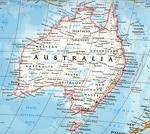Down Under in Tenerife
 Living outside of your own country is never that simple. What could be more challenging than to live in a strange new land and foreign culture? While travellers have it easy, I think that it is particularly difficult for expatriates. Obviously the greater apart the host & donor countries, the harder it becomes.
Living outside of your own country is never that simple. What could be more challenging than to live in a strange new land and foreign culture? While travellers have it easy, I think that it is particularly difficult for expatriates. Obviously the greater apart the host & donor countries, the harder it becomes.
In my case, I was born in Sydney and resided there for the next 27 years. Yet Tenerife is the opposite Sydney in just about every respect. We drive on the wrong side of the road, the geography of the islands are totally different, the seasons are completely reversed and both places are at the antipode. I reckon the following quote really does apply in this case:
«You can’t get any further away before you start coming back.» – Mr. Truman Burbank.
One of the most difficult things for any immigrant to deal with is making new friends or co-patriates. Being an Australian living in Tenerife, this isn’t easy to cope with. Not counting my two cousins who were born in Australia and moved here as toddlers, I have met precisely three Australian citizens since I came here in late 2005. Two individuals have decided to make Tenerife their home (at least for the foreseeable future); they now speak fluent Spanish and have integrated well as a result. I firmly believe that the only barrier to learning a language is your own desire or reluctance to do so. The other Australian was a tourist on a short visit.
My own personal story is quite simple. I came to this island in late 2005 after meeting a Canarian woman (I’m glad not the only one!). But another one of my motives for coming here was the vague intention of starting some sort of cycling-related business. During the Winter when the rest of Europe experiences much colder temperatures, Tenerife retains its mediterranean climate and therefore becomes one of the best places for amateur and professional cyclists to train. The road up to Izaña, at an altitude of 2300m, is higher than any point in Australia. Being a keen cyclist, I saw that as a big opportunity.
For the first two years after moving to the North of Tenerife, I felt extremely ‘displaced’ – almost every single day. Even after 3 years, I continue feeling somewhat ‘lost’ here. Like neither is my home and yet they both are, all at the same time. For a long, long time I listened to the song «Where do I belong?» by Anastacia, repeating it over and over again, analysing why I am here and if it was the right thing to do. The thought (or rather temptation) of going back haunts me all the time.
The major problem for me is that Tenerife is an extremely small island compared with Australia. 4000 times smaller to be exact. In Australia, we leave vast tracts of land untouched. Here the land is constantly tended, tweaked and re-worked. Everywhere I look I see relentless construction all over the island. So I’m much more aware of these changes and their effect on this whole planet.
Lately, things seem so artificial, I’ve had the distinct feeling that I’m living in captivity in Tenerife, a bit like a goldfish living in an extra large goldfish bowl. Because of that, I have developed a pretty strong sense of agoraphobia; every time I travel down the same road, it reinforces how trapped I feel here. The only place I can find refuge is within the forest surrounding Mt Teide National Park. Although there’s also the sense that everything has become familiar, so I definitely feel protected within a strange sort of comfort zone.
On this island, there are generally no trees below about 1000m. But you can’t set about planting trees everywhere because that’s not the way Canarians would have it (it creates too much shade for their food crops). And trying to change them is no easier than trying to change your own society.
On a more positive note, life is somehow more simple now; for me it’s a bit like going back in time 10 years. For example, you can walk onto a bus or into a bank and there are no security screens. When you ring up an organisation, you are able to talk with a person straight away, not merely a computer. People definitely have more contact with each other and they’re not so much living on the edge of their breaking point. I suspect that I was escaping the stressful city life in Sydney more than anything else. Perhaps I would have been better off if I had have chosen to move to a country town and opted for a change in career instead of moving to the other side of the world.
I think I have become a richer person, but obviously not in the monetary sense. In fact I read somewhere that Australians were the third richest expatriates in the world. The one exception? Australian expatriates living in Spain did not earn anywhere near the other groups that were surveyed. Reading that did nothing to boost my confidence for a financially brighter future. Who knows -maybe I’ll be the exception to the exception- but I doubt it.
Australian expatriates living overseas are the third wealthiest in the world, with almost 40 per cent earning more than GBP100,000 (approx A$208,0001) a year, according to the biggest international survey on expatriate living ever released.





Discussion Area - Leave a Comment